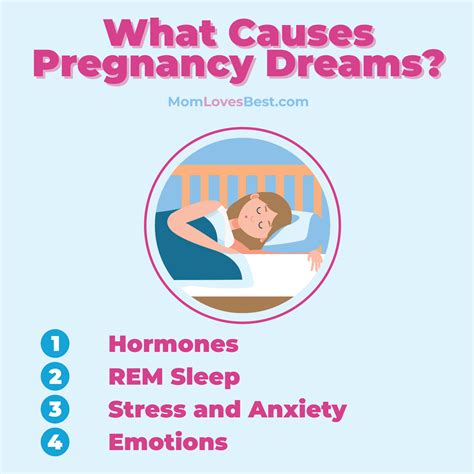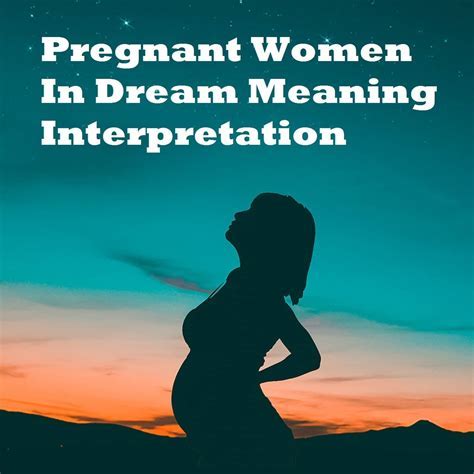Embarking on the beautiful journey of motherhood brings forth a range of emotions and experiences that are as diverse as the unborn life growing within. Throughout this miraculous path, women may encounter a vast tapestry of dreams, each with their own unique story to tell. Amidst these dreams lies one that captivates attention, a dream that delves into the depths of uncertainty, curiosity, and even fear.
While carrying a precious life, expectant mothers occasionally confront visions of infants that deviate from the conventional perception of health and perfection. These glimpses into a different reality prompt introspection and rouse our desire to understand the profound messages that they may hold. Exploring the possible meanings and causes behind these dreams can shed light on the intricate connection between a woman's subconscious mind and her pregnancy journey.
Embracing the significance of these dreams is a gateway to unraveling the intricate web of the human psyche. The subconscious mind artfully weaves together a myriad of emotions and concerns, entangling them with the extraordinary transformation happening within the mother's body. Dreams during pregnancy are not mere illusions, but rather powerful reflections of the expectant mother's psyche, providing a safe haven for her to process and confront her deepest fears and desires.
So, what prompts these visions of babies that deviate from the norms of physical perfection, leaving an indelible mark on a mother's consciousness? Unearthing the causes of these dreams requires a thoughtful exploration of the expectant mother's emotional landscape. From the anxiety induced by the sense of responsibility to the primal instinct for nurturing and protecting, a pregnant woman's mind becomes a crucible for the creation of dreams that encapsulate her most profound concerns.
The Impact of Pregnancy Hormones on Dream Patterns

During pregnancy, hormonal fluctuations play a significant role not only in physical changes but also in the realm of dreams. The various hormones released during this period can potentially influence the content, frequency, and intensity of dreams experienced by expectant mothers.
1. Progesterone: This hormone, commonly known for its role in maintaining a healthy pregnancy, can also impact dream patterns. Increased levels of progesterone may lead to more vivid and elaborate dreams.
2. Estrogen: Another hormone that experiences significant shifts during pregnancy, estrogen can contribute to emotional and symbolic dream experiences. It is believed to enhance the visual and creative aspects of dreams.
3. Oxytocin: Known as the "bonding hormone," oxytocin helps establish a strong connection between mother and child. Its influence on dreams can manifest as dreams centered around nurturing, bonding, and the impending arrival of the baby.
4. Prolactin: This hormone, responsible for milk production, can also influence dream content. Dreams related to nourishment, breastfeeding, and motherhood are more likely to occur due to elevated levels of prolactin.
5. Cortisol: Increased levels of stress hormones, such as cortisol, during pregnancy may lead to anxiety-filled dreams or nightmares. These dreams can reflect the expectant mother's concerns, fears, and anxieties about childbirth and becoming a parent.
Understanding the impact of pregnancy hormones on dreams provides valuable insights into the emotional and psychological experiences of expectant mothers. By recognizing the potential influence of hormones on dream patterns, pregnant individuals can navigate their dreamscape with a better understanding of the messages and emotions conveyed through their dreams.
Psychological Factors Influencing Dream Content during Pregnancy
During pregnancy, the experience of dreaming is influenced by various psychological factors that are unique to this transformative period in a woman's life. These factors can contribute to the content and themes of dreams, providing insight into the emotional and psychological state of the expectant mother. Understanding these factors can help contextualize and interpret the dreams that pregnant women might have throughout their journey towards motherhood.
- Hormonal Fluctuations: Pregnancy is characterized by significant hormonal changes, including increased levels of estrogen and progesterone. These hormonal fluctuations can impact an expectant mother's emotional state, leading to vivid and intense dreams. Hormonal influences on dream content can range from heightened emotions to specific themes related to pregnancy and childbirth.
- Anxiety and Stress: Pregnancy is often accompanied by increased levels of anxiety and stress, as expectant mothers navigate physical and emotional changes and prepare for the arrival of their baby. These psychological stressors can manifest in dreams, resulting in themes related to worry, fear, or uncertainty about the pregnancy, childbirth, or parenting.
- Anticipation and Excitement: Pregnancy is a time of anticipation and excitement as expectant mothers eagerly await the arrival of their baby. These positive emotions can find expression in dreams, with themes centered around joy, hope, and love. Such dreams may depict images of bonding with the unborn baby or the feeling of overwhelming happiness associated with impending motherhood.
- Body Image and Self-Esteem: Pregnancy brings significant changes to a woman's body, which can influence her body image and self-esteem. Dreams during pregnancy can reflect these feelings, with themes revolving around body image, self-acceptance, and self-confidence. Dreams may explore the expectant mother's perception of her changing physical appearance or her ability to embrace her new role as a mother.
- Relational Dynamics: The transition to motherhood often accompanies shifts in various relational dynamics, including the expectant mother's relationship with her partner, family, and friends. Dreams can provide insight into these relationships, depicting scenarios related to communication, support, or conflict. They may reflect the expectant mother's desires and concerns regarding her support system during this transformative time.
By examining the psychological factors influencing dream content during pregnancy, we gain a deeper understanding of the complex emotional and cognitive processes that occur during this unique period. Interpreting these dreams can help expectant mothers explore and address their fears, hopes, and expectations, contributing to their overall well-being and preparing them for the journey of motherhood ahead.
Interpreting Dreams about Abnormal Infants during Pregnancy: Historical and Cultural Perspectives

In the realm of prenatal dreams, the imaginations that arise are deeply intertwined with cultural beliefs, historical contexts, and symbolic meanings. Exploring the interpretation of dreams featuring deformed infants during pregnancy opens up a myriad of fascinating cultural and symbolic perspectives.
Throughout history, various cultures have attached diverse interpretations to dreams about abnormal babies during pregnancy. These interpretations often reflect the values, fears, and beliefs prevalent within their societies. For instance, in ancient Greek and Roman societies, dreams of deformed infants were often seen as omens of impending disaster or a warning sign from the gods. In contrast, some Native American tribes interpreted such dreams as representations of special spiritual gifts or divine messages.
The symbolic meaning of dreams about deformed infants while pregnant can also vary widely. Freudian psychoanalysis, for example, may offer a psychological perspective that associates these dreams with unresolved anxieties or fears surrounding the process of childbirth and motherhood. Alternatively, from a spiritual standpoint, some interpret these dreams as indicators of personal transformation, highlighting the need for self-reflection and growth during the transformative period of pregnancy.
Furthermore, cultural influences play a significant role in shaping interpretation. In societies where physical appearance holds significant importance, dreams about deformed babies may symbolize apprehensions regarding societal expectations and standards. In contrast, cultures that emphasize spiritual connections may interpret such dreams as messages from the spiritual realm, urging expectant mothers to focus on their spiritual well-being.
Overall, understanding and interpreting dreams about deformed babies during pregnancy necessitates a multidimensional approach that takes into account cultural, historical, and symbolic perspectives. By delving into various interpretations, expectant individuals can gain insight into their own emotions, concerns, and spiritual beliefs, facilitating a deeper understanding of their experiences during this transformative stage of life.
FAQ
What does it mean if I dream about a deformed baby while pregnant?
Dreaming about a deformed baby while pregnant can be unsettling, but it is important to remember that dreams are often symbolic in nature. Such dreams may reflect the anxieties, fears, and concerns you have about the health and well-being of your unborn child. It is not uncommon for expectant mothers to have these types of dreams, as they are processing their emotions and subconscious thoughts about their pregnancy.
Are there any specific causes for dreaming about a deformed baby during pregnancy?
Dreams about deformed babies during pregnancy can be triggered by various factors. These may include the normal anxiety and worries associated with pregnancy, concerns about the baby's health, stress, hormonal changes, or even external influences such as movies or stories that feature deformed babies. It is essential to remember that dreams are highly personal, and their interpretation can vary from person to person.
Should I be worried if I frequently dream about a deformed baby while pregnant?
Frequent dreams about a deformed baby during pregnancy can be distressing, but they are generally not a cause for concern. Dreams often serve as a way for our subconscious minds to process our emotions and thoughts. However, if these dreams become overwhelming or cause excessive anxiety, it may be helpful to discuss them with a healthcare provider or a mental health professional who can provide support and guidance.
Is there a way to interpret these dreams about deformed babies during pregnancy?
Interpreting dreams is subjective, and there is no one-size-fits-all method. However, some common interpretations of dreams about deformed babies during pregnancy suggest that they may represent the expectant mother's fears about the baby's health or potential abnormalities. These dreams can also reflect general anxieties and uncertainties about becoming a parent. It is important to remember that dream interpretation is highly personal, and the true meaning of these dreams can only be determined by the dreamer.



